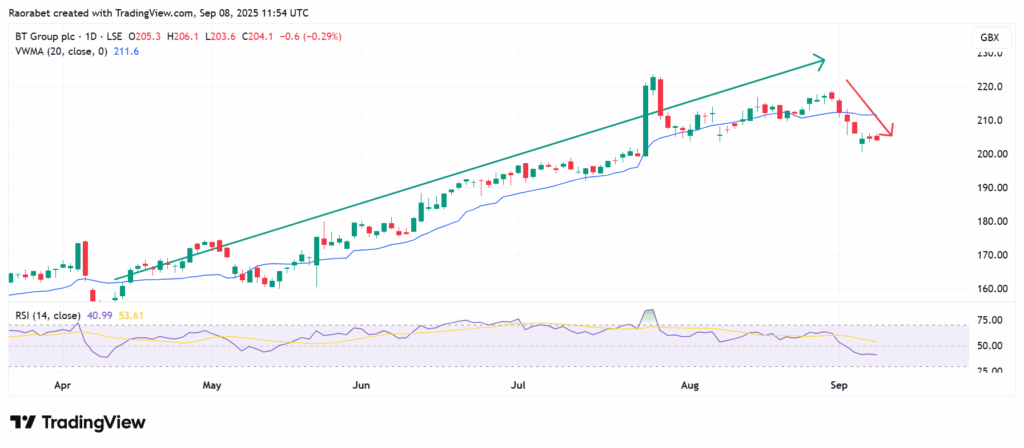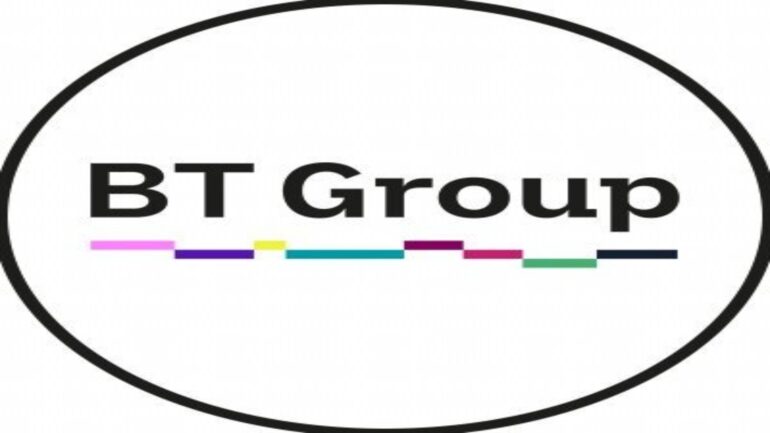- BT stock price is up by more than 40% year-to-date, but a recent shift in fundamentals has brought downward pressure.
BT stock has gone down recently because of concerns about its value and an analyst downgrade, even though the business has made a lot of progress on its turnaround strategy. The stock rose sharply in 2024 and early 2025, with its price going up by more than 45% in the first half of the year. Some analysts, however, believe that BT stock has reached its full value because of its great performance. That perception has led to downgrades and profit-taking by investors.

BT stock price pattern on the daily chart. The red arrow shows the recent decline, crossing below the Volume Weighted Moving Average (VWMA). Source: TradingView
Why BT Stock Price is Declining
There are a few main reasons why BT’s stock price has gone down:
- Downgrades by Analysts: Analysts at BofA Securities recently changed their rating of BT’s stock from “buy” to “neutral.” This move was prompted by the stock’s price is no longer attractive after its big rise, even if the company has made beneficial adjustments to how it runs its business. A high net debt of around £20 billion and a pension shortfall of £3.7 billion raises the risk level, especially since high interest rates make refinancing more expensive and less flexible.
- Concerns about valuation: BT stock price 41% upsurge year-to-date has seen the company’s valuation spike. This makes it more likely to tumble because even minor negative news or a prolonged lack of new good news might drive investors sell their shares. Also, some investors think that the stock price has already priced in much of the good news, even though the company’s finances are getting better.
- Growing competition: BT is facing a lot of competition in the UK market, even though it has upped its efforts in recent months. The number of customers who use the company’s fixed-line services has gone down, and competitors like Vodafone and Three, as well as alternative networks (alt-nets), are gaining ground. Some investors are concerned that this competition could hurt future revenue growth.
The Way Back Up
- Management Efficiency: Even though there are some short-term challenges, BT’s stock has a clear way to start going up again. CEO Allison Kirkby is overseeing implementation of the company’s turnaround strategy, which is based on a strong base of long-term strategic initiatives that are starting to show results.
- Fibre Rollout and Cost Savings: BT is almost done with a substantial Openreach full-fibre rollout that will reach 25 million homes by the end of 2026. This large investment in infrastructure will greatly lower future capital costs, which will greatly increase free cash flow. The company is also on course to save £3 billion by 2030, which will improve its financial standing.
- Improving Financials: The company’s most recent financial results suggest that the plan is working. Even though revenue has gone down, good cost control has resulted to an increase in underlying EBITDA and a big increase in normalized free cash flow. To alleviate its massive debt and meet its large pension commitments, this fiscal improvement is essential.
- Dividends and Future Cash Flow: With the fiber rollout winding down and capital expenditures falling, BT anticipates a free cash flow of £2 billion in FY27 and £3 billion by the decade’s end, according to its financial projections. Even with these problems, it seems likely that things will get better. BT stuck to its FY26 goal, saying it wants to have £8–9 billion in free cash flow by FY27 by lowering costs aggressively. Since 2023, the company has saved £3 billion by slashing jobs and making operations more efficient.
The decline is mainly due to an analyst downgrade and valuation concerns after the stock’s significant rally.
Consumer broadband losses, business unit weakness, £20B debt, and inflationary pressures hurt margins and the outlook for BT stock price.
Yes, with £3B cost cuts, fibre growth, and 4% dividend yield BT could catalyse a turnaround in its stock price trajectory.




